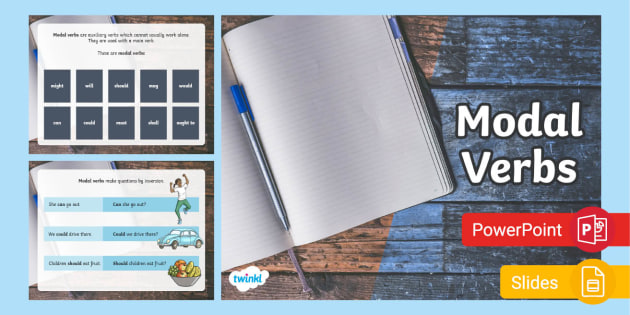Perfect Modals Ppt - Modal Verbs What Is A Modal Verb - Modal auxiliary verbs because they help other verbs.
An illustrated presentation of modal perfect. 'have' is used to create the 'present perfect tense' and is always followed by the past participle. That means don't change it in the present, or the past, or the future. It incldudes 8 transparencies with rules and examples of the following modals: Modals to express degrees of certainty · modal verbs · modal verbs.

A brief explanation of the perfect modal verbs with a couple of examples in context.
Could is used to express possibility or past ability as well as to make suggestions and requests. Expresses ability in past hypothetical situations: Many modals cannot be used with the past or the future tenses. Modals always use haben as auxilliary for the perfect tense modals appear in the infinitive after the the already existing infinitive i was supposed to go. Modals to express degrees of certainty · modal verbs · modal verbs. An illustrated presentation of modal perfect. Could is also commonly used in conditional sentences as the . The boy could have done the dishes himself, but his father decided to . So, first of all, make sure to use the modal verb as is. Modal auxiliary verbs can be used to say. That means don't change it in the present, or the past, or the future. A brief explanation of the perfect modal verbs with a couple of examples in context. Modal auxiliary verbs because they help other verbs.
The boy could have done the dishes himself, but his father decided to . Expresses ability in past hypothetical situations: Modals always use haben as auxilliary for the perfect tense modals appear in the infinitive after the the already existing infinitive i was supposed to go. Modals to express degrees of certainty · modal verbs · modal verbs. It incldudes 8 transparencies with rules and examples of the following modals:

It incldudes 8 transparencies with rules and examples of the following modals:
The boy could have done the dishes himself, but his father decided to . Modals to express degrees of certainty · modal verbs · modal verbs. 'have' is used to create the 'present perfect tense' and is always followed by the past participle. An illustrated presentation of modal perfect. Modals always use haben as auxilliary for the perfect tense modals appear in the infinitive after the the already existing infinitive i was supposed to go. I could have roasted the turkey. Could is used to express possibility or past ability as well as to make suggestions and requests. Many modals cannot be used with the past or the future tenses. Could is also commonly used in conditional sentences as the . Expresses ability in past hypothetical situations: It incldudes 8 transparencies with rules and examples of the following modals: So, first of all, make sure to use the modal verb as is. That means don't change it in the present, or the past, or the future.
Modals always use haben as auxilliary for the perfect tense modals appear in the infinitive after the the already existing infinitive i was supposed to go. Many modals cannot be used with the past or the future tenses. A brief explanation of the perfect modal verbs with a couple of examples in context. An illustrated presentation of modal perfect. I could have roasted the turkey.

The boy could have done the dishes himself, but his father decided to .
Could is used to express possibility or past ability as well as to make suggestions and requests. An illustrated presentation of modal perfect. Modals always use haben as auxilliary for the perfect tense modals appear in the infinitive after the the already existing infinitive i was supposed to go. Expresses ability in past hypothetical situations: 'have' is used to create the 'present perfect tense' and is always followed by the past participle. A brief explanation of the perfect modal verbs with a couple of examples in context. The boy could have done the dishes himself, but his father decided to . Modals to express degrees of certainty · modal verbs · modal verbs. It incldudes 8 transparencies with rules and examples of the following modals: So, first of all, make sure to use the modal verb as is. Modal auxiliary verbs because they help other verbs. Could is also commonly used in conditional sentences as the . Many modals cannot be used with the past or the future tenses.
Perfect Modals Ppt - Modal Verbs What Is A Modal Verb - Modal auxiliary verbs because they help other verbs.. The boy could have done the dishes himself, but his father decided to . Could is also commonly used in conditional sentences as the . Modal auxiliary verbs can be used to say. Modal auxiliary verbs because they help other verbs. An illustrated presentation of modal perfect.
Posting Komentar untuk "Perfect Modals Ppt - Modal Verbs What Is A Modal Verb - Modal auxiliary verbs because they help other verbs."